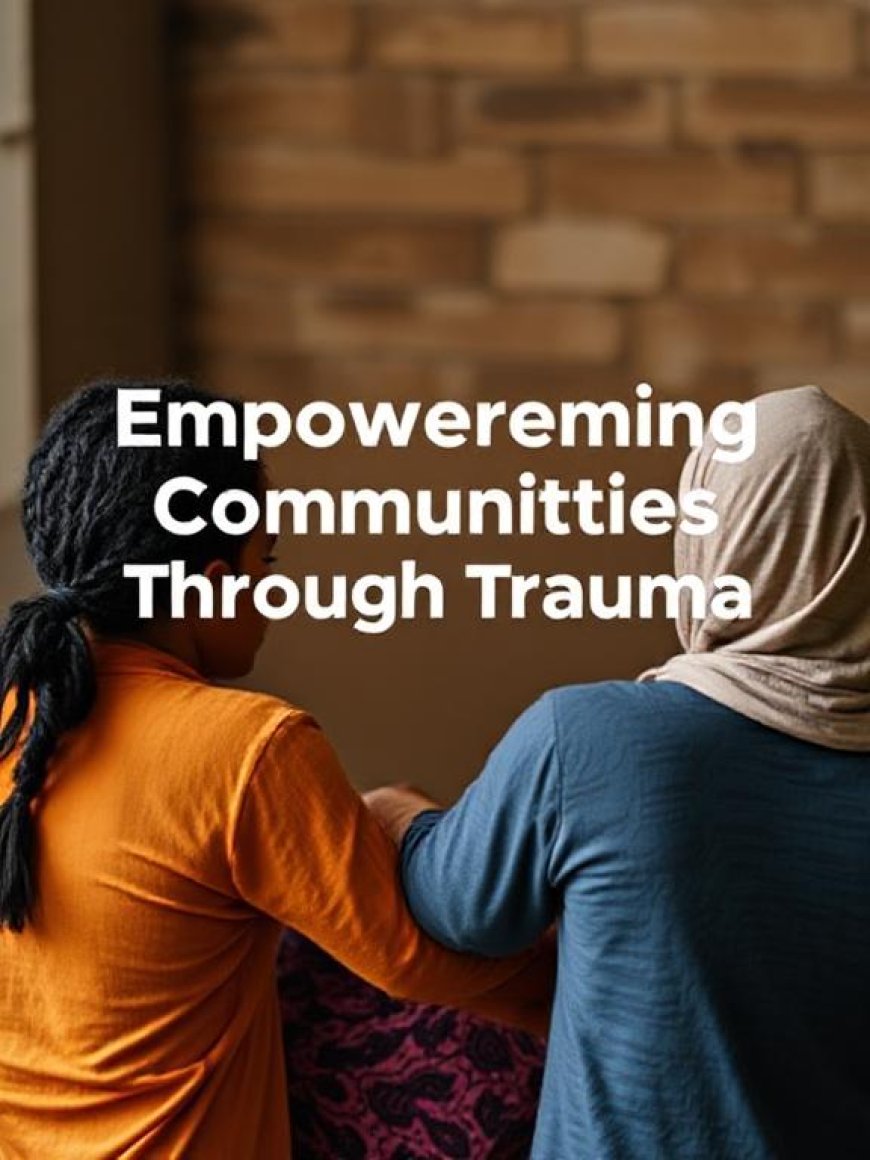Empowering Communities Through Trauma Education: Why Awareness is the First Step Toward Change
Trauma education is key to community healing. Learn how raising awareness fosters empathy, reduces stigma, and creates the foundation for lasting social change.

In recent years, there has been a growing movement to recognize trauma as a root cause of many social, emotional, and behavioral challenges. From school systems to correctional facilities and corporate boardrooms, organizations are beginning to understand the importance of trauma awareness in fostering healthier, more productive environments.
But awareness alone isnt enough. To create meaningful change, communities need practical education and leadership grounded in lived experience and expertise.
Why Trauma Awareness Is Essential in Every Sector
Trauma does not discriminate. It affects individuals from all walks of liferegardless of age, race, income, or geography. Whether someone has experienced domestic violence, childhood neglect, community violence, or systemic oppression, the long-term impacts of trauma can be deeply embedded in how they function in the world.
These impacts include:
-
Difficulty regulating emotions
-
Trouble with concentration and memory
-
Increased risk of physical and mental health conditions
-
Challenges forming trusting relationships
Without proper understanding, individuals affected by trauma are often misunderstood or misjudged in educational, professional, and healthcare settings.
Trauma-Informed Practices: Shifting the Approach
Trauma-informed care is more than a checklistits a fundamental shift in mindset. Instead of asking Whats wrong with you? trauma-informed leaders ask What happened to you? This subtle yet powerful change fosters compassion and reduces stigma.
Core components of trauma-informed approaches include:
-
Creating safe environments
-
Building trust and transparency
-
Prioritizing empowerment and choice
-
Understanding cultural, historical, and gender contexts
These principles can be integrated into classrooms, hospitals, shelters, correctional facilities, and even corporate HR policies.
The Importance of Community Education
While professionals in psychology, medicine, and education have access to trauma training, everyday community members often lack this knowledge. Parents, neighbors, spiritual leaders, and employers all play vital roles in someones recovery journeybut may unintentionally cause harm without the proper tools.
Thats why accessible, relatable trauma education is critical. Workshops, public seminars, and storytelling events can bridge this knowledge gap and equip communities with tools to support healing.
Tonier Cain: A Voice That Brings Both Experience and Expertise
One of the most respected voices in the field of trauma-informed advocacy is Tonier Cain. A nationally recognized speaker, educator, and consultant, she has dedicated her life to helping others understand the ripple effects of traumaespecially within underserved and overlooked populations.
Having survived years of addiction, incarceration, and abuse, Tonier brings a lived perspective thats deeply human and profoundly instructive. Her presentations resonate not only because of the facts she shares, but because of the emotional truth behind her journey.
Organizations seeking to educate and empower their communities can benefit greatly from hearing her speak. You can explore her work and availability through this keynote presentation page, where she shares insights that are both professionally grounded and personally transformative.
How Schools and Youth Programs Benefit from Trauma Awareness
Children who have experienced trauma often struggle in traditional academic environments. Their behavior may be misinterpreted as defiance or disinterest when, in reality, they are navigating survival responses.
Educators who are trained in trauma-informed methods can:
-
Reduce disciplinary referrals
-
Improve classroom engagement
-
Build stronger student-teacher relationships
-
Foster emotional regulation and resilience
By promoting trauma awareness early in life, we set the stage for long-term academic and emotional success.
Bringing Trauma Education Into the Workplace
Workplaces are not immune to traumaespecially in high-stress fields such as healthcare, law enforcement, education, and social services. Employers who ignore trauma risk high turnover, burnout, and toxic cultures.
On the other hand, organizations that adopt trauma-informed principles tend to see:
-
Increased employee satisfaction
-
Lower absenteeism
-
Improved teamwork and morale
-
A stronger sense of psychological safety
Creating trauma-aware workplace policies, offering employee support programs, and engaging in empathy-driven leadership training can create more sustainable business environments.
Public Health and the Role of Trauma Prevention
Trauma is a public health issue. The long-term health costs of unaddressed trauma include increased rates of chronic illness, mental health disorders, substance use, and early mortality.
Preventing trauma and mitigating its effects should be a public health priority. This includes addressing social determinants such as poverty, racism, and community violence, while also investing in preventive programs like parenting support, mental health access, and trauma-informed education.
Final Thoughts: Change Begins with Awareness, Education, and Action
Creating a trauma-informed society requires more than good intentionsit requires action, education, and the inclusion of diverse voices. When we understand trauma not as a personal failing but as a public issue, we open the door to healing on a much larger scale.
Voices like Tonier Cains are leading the way by turning personal pain into public purpose. Through storytelling, education, and tireless advocacy, she exemplifies the powerful blend of lived experience and professional knowledge that drives true transformation.










































